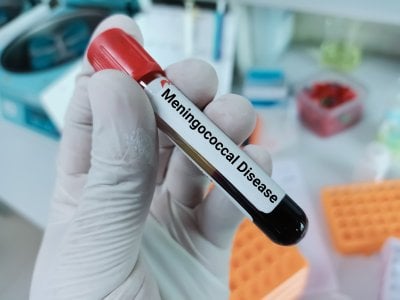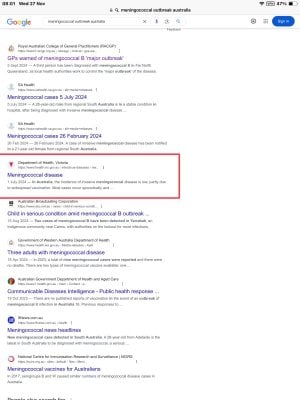Aussie man in critical condition as ‘invasive’ disease sparks urgent health response
- Replies 14
In a concerning development, an Aussie man is in critical condition due to an alarming health concern that has prompted authorities to take swift action.
In an effort to contain the situation, several individuals have been treated to prevent further spread.
This incident has raised awareness and concern among the community, urging everyone to stay vigilant and informed about the symptoms and preventive measures associated with this serious condition.
A man in his 30s is currently in critical condition at an Adelaide hospital, fighting a severe case of meningococcal disease.
SA Health announced on Monday, November 25, that nine additional individuals who had contact with the infectious case have also received treatment.
‘Nine people have been directed to receive clearance antibiotics to prevent further transmission,’ they said.

The strain responsible for the infection has been identified as serogroup B, a type for which many South Australians are vaccinated.
SA Health characterised the infection as ‘invasive’, while Healthdirect noted that it ‘can develop quickly and is life-threatening’.
Invasive meningococcal disease can lead to life-threatening conditions such as septicaemia (bacterial blood poisoning), sepsis (a potentially fatal reaction to infection), and meningitis (an inflammation of the membranes surrounding the brain and spinal cord).
The man's case is the 27th reported in South Australia this year, with the majority being the serogroup B strain, which is particularly prevalent in the state.
There has been an uptick in cases compared to the previous year, with 2024 seeing an increase from 21 to 27 cases and from 17 to 23 cases of the B strain specifically.
According to SA Health, this strain, also known as meningococcal B, has been the most prevalent type in the state over the past two years.
There have been no cases of strain W in 2024 and three in 2023, while strain Y has seen three cases in 2024 and one in 2023.
Vaccines for several strains, including meningococcal B, are available in South Australia.
‘The meningococcal B vaccine is available and free for infants at six weeks, four months, and 12 months and for adolescents in Year 10. The ACWY vaccine is available and free for infants at 12 months and in adolescents in Year 10,’ SA Health stated.
However, they added, ‘As vaccines do not protect against all types of meningococcal disease, vaccinated people must still be alert for the symptoms of meningococcal disease.’
Symptoms of meningococcal disease can include headache, fever, vomiting, neck stiffness, and discomfort when looking at lights.
‘A skin rash may occur, with tiny red or purple spots that soon spread and enlarge to look like fresh bruises,’ SA Health added.
‘At later stages of the illness, people may develop confusion and shock.’
In children, symptoms may manifest differently, including pale, blotchy, or abnormally coloured skin, among other symptoms.
‘Children may be fretful, difficult to wake, and refuse to eat. They may have leg pain, cold hands and feet, and a high-pitched or moaning cry,’ SA Health stated.
The recent critical case in Adelaide highlights the ongoing threat of meningococcal disease in South Australia.
This situation mirrors a concerning trend observed in Western Australia, where a deadly outbreak emerged for the first time earlier this year.
Both states are grappling with the challenges posed by this invasive disease, underscoring the importance of vigilance and vaccination to prevent further spread and safeguard public health.
 We invite you to share your thoughts and experiences regarding meningococcal disease and vaccinations. Have you or your loved ones been vaccinated? Have you encountered any challenges in accessing vaccines? Your insights could be invaluable to our community, so please comment below and join the conversation.
We invite you to share your thoughts and experiences regarding meningococcal disease and vaccinations. Have you or your loved ones been vaccinated? Have you encountered any challenges in accessing vaccines? Your insights could be invaluable to our community, so please comment below and join the conversation.
In an effort to contain the situation, several individuals have been treated to prevent further spread.
This incident has raised awareness and concern among the community, urging everyone to stay vigilant and informed about the symptoms and preventive measures associated with this serious condition.
A man in his 30s is currently in critical condition at an Adelaide hospital, fighting a severe case of meningococcal disease.
SA Health announced on Monday, November 25, that nine additional individuals who had contact with the infectious case have also received treatment.
‘Nine people have been directed to receive clearance antibiotics to prevent further transmission,’ they said.

An Adelaide man is in critical condition with invasive serogroup B meningococcal disease. Credit: Shutterstock
The strain responsible for the infection has been identified as serogroup B, a type for which many South Australians are vaccinated.
SA Health characterised the infection as ‘invasive’, while Healthdirect noted that it ‘can develop quickly and is life-threatening’.
Invasive meningococcal disease can lead to life-threatening conditions such as septicaemia (bacterial blood poisoning), sepsis (a potentially fatal reaction to infection), and meningitis (an inflammation of the membranes surrounding the brain and spinal cord).
The man's case is the 27th reported in South Australia this year, with the majority being the serogroup B strain, which is particularly prevalent in the state.
There has been an uptick in cases compared to the previous year, with 2024 seeing an increase from 21 to 27 cases and from 17 to 23 cases of the B strain specifically.
According to SA Health, this strain, also known as meningococcal B, has been the most prevalent type in the state over the past two years.
There have been no cases of strain W in 2024 and three in 2023, while strain Y has seen three cases in 2024 and one in 2023.
Vaccines for several strains, including meningococcal B, are available in South Australia.
‘The meningococcal B vaccine is available and free for infants at six weeks, four months, and 12 months and for adolescents in Year 10. The ACWY vaccine is available and free for infants at 12 months and in adolescents in Year 10,’ SA Health stated.
However, they added, ‘As vaccines do not protect against all types of meningococcal disease, vaccinated people must still be alert for the symptoms of meningococcal disease.’
Symptoms of meningococcal disease can include headache, fever, vomiting, neck stiffness, and discomfort when looking at lights.
‘A skin rash may occur, with tiny red or purple spots that soon spread and enlarge to look like fresh bruises,’ SA Health added.
‘At later stages of the illness, people may develop confusion and shock.’
In children, symptoms may manifest differently, including pale, blotchy, or abnormally coloured skin, among other symptoms.
‘Children may be fretful, difficult to wake, and refuse to eat. They may have leg pain, cold hands and feet, and a high-pitched or moaning cry,’ SA Health stated.
The recent critical case in Adelaide highlights the ongoing threat of meningococcal disease in South Australia.
This situation mirrors a concerning trend observed in Western Australia, where a deadly outbreak emerged for the first time earlier this year.
Both states are grappling with the challenges posed by this invasive disease, underscoring the importance of vigilance and vaccination to prevent further spread and safeguard public health.
Key Takeaways
- An Adelaide man is in critical condition with invasive meningococcal disease, with the infecting strain identified as serogroup B.
- Nine people who had contact with the infectious individual have been treated with antibiotics to prevent further transmission.
- There has been an increase in meningococcal cases in South Australia, with the B strain being the most common in the last two years.
- SA Health advised that even vaccinated individuals must remain alert for meningococcal symptoms, as vaccines do not protect against all types of the disease.








